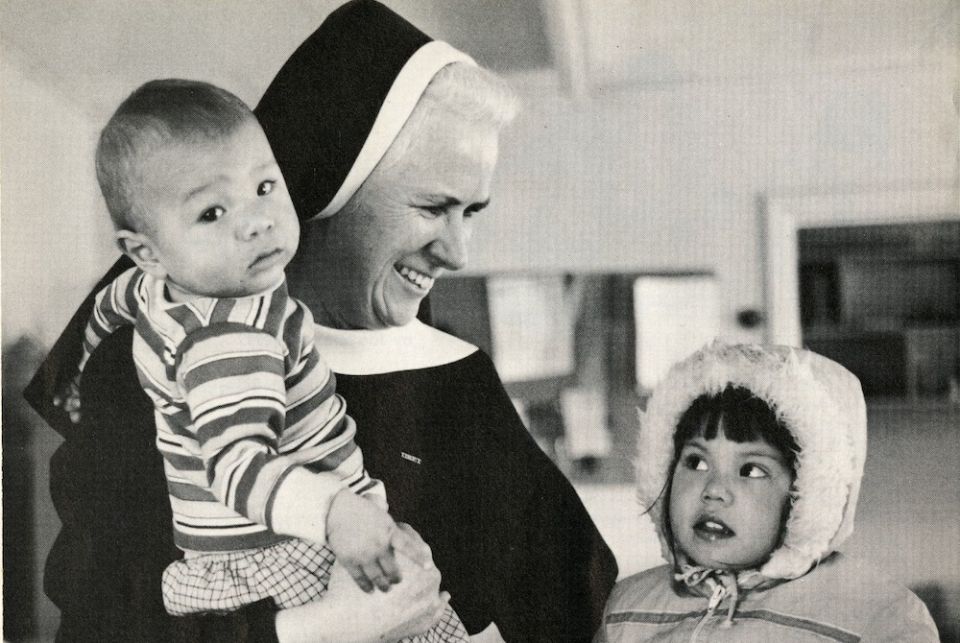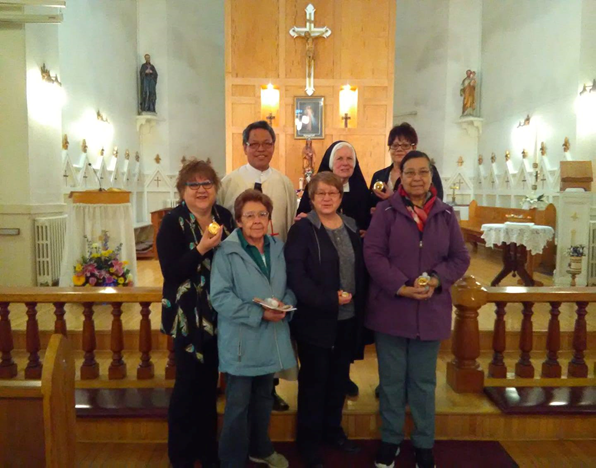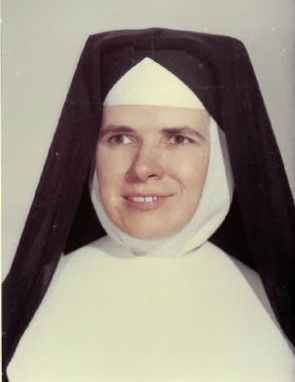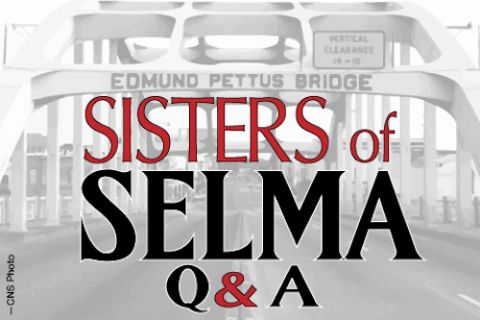Mary Christine Taylor 1 with children c.jpg

Editor's note: Since August, Global Sisters Report has featured biweekly interviews with Catholic sisters and former sisters who worked and/or marched in Selma, Alabama, in 1965. We wanted to give them an opportunity to share their thoughts about current racial events, protests and Black Lives Matter. This is the final Q&A in the series. Read all of the Q&As.
As a graduate student working on a doctorate in history at St. Louis University, Sr. Mary Christine Taylor, a Sister of St. Joseph of Watertown, New York, was asked by local clergy to participate in the March 25, 1965, rally in Montgomery, Alabama, the final day of the Selma-to-Montgomery voting rights march to the Alabama capitol. Moved by what she had seen in poorer neighborhoods in St. Louis, Taylor had been working with the Black community around the university, providing catechetics and visiting the sick while she completed her graduate work.
Besides her experiences at the university and in the inner city, she was also influenced by two Black sisters attending graduate school with her at St. Louis University. The sisters were from the Sisters of the Holy Family in Louisiana and told her stories about the abuse they experienced when attempting to vote in New Orleans. She was stunned.
Before leaving for Selma, "I remember thinking I was ready to take what the day brought." But in an April 18, 1965, letter addressed to Mother Immaculata in Watertown about her Selma experience, she wrote: "We went to Montgomery to give of ourselves, but I must say in truth that we received far more in edification and spirit than we could give."
After completing her degree in 1967, Taylor returned to teach and become dean at Mater Dei College, which the Sisters of St. Joseph of Watertown founded near Ogdensburg, New York.
In 1972, the St. Regis Mohawk Reservation, which is located in both Canada and the United States, requested educational assistance from her and the college. Taylor began to provide college classes on the reservation to help tribal members advance their education and find better employment.
Mary Christine Taylor 2 senior nutrition c.jpg

According to Catholic Extension, which awarded Taylor the Lumen Christi Award in 1984, she trained Mohawk graduates who now run most of the community services on the reservation. Taylor's graduates became "alcohol rehabilitation counsellors, school teachers, nutritionists, librarians and nurses," including at least one medical doctor.
At its peak, the Mohawk Cultural Center was home to multiple courses on four nights a week. After Mater Dei College closed in 1999, Taylor continued her work with the Mohawks, receiving state grants to begin a senior center and an office for aging.
Currently, Taylor continues to serve the Mohawks by distributing Communion to shut-ins and those who lack mobility or cannot attend Mass. St. Regis Catholic Church Mission, which French Jesuits founded in 1755, is in Quebec and serves the reservation on both sides of the border.
Reflecting on her almost five decades of working with the Mohawks, Taylor said she has no intention of slowing down: "I travel around the whole area to visit over 150 people a week. I divide my visits by days and have people to help me. I'm on the road a lot."
GSR: How do you compare your Selma experiences in 1965 with today's Black Lives Matter movement?
Taylor: I felt safe at the Selma march. We were with people trying to get voting rights. I realized that Dr. Martin Luther King Jr. and the Rev. Ralph Abernathy were like Gandhi and advocated a peaceful protest, not a violent protest. Black people have suffered immeasurably. We walked together and sang and prayed, but we did not have any violence. I was eager to be part of a march that would bring retribution to them. We were trying to restore human rights to human beings.
That's how it's different from today. When I see violence, I am not happy. Silent protests are very good. When I see people throwing rocks and destroying things — that's not what it was meant to be. I think it should be about bringing respect to each individual without violence. Who are these people stirring up all the violence?
Advertisement
Advertisement
Mary Christine Taylor 4 at St. Regis c.jpg

What did you learn in Selma that was useful in your decades of working with the St. Regis Mohawk Tribe?
I have worked 46 years with the Mohawks in Canada and the United States. For decades, the Mohawk tribe has battled internal and external tensions concerning land, cultural practices and the education of their children. They resented white rule and that their children [in some cases, without parental consent] had been taken to residential schools run by religious. During times of tension, the Mohawk chief knew the sisters since we had helped educate him. So, he told us if we ever needed anything, to let him know. He would protect us.
I see overlap between Native American and Black issues. Native people were here first. This was their land, so when I look back on history, I see how we've treated them, including the Trail of Tears. Blacks were forced to come here and made slaves. Our country participated in two different sets of inhuman behavior.
What would you say or teach to young activists of any social movement?
I would tell them to imitate Martin Luther King, who wanted rights for his people but knew how to do it with respect. I advocate sit-ins and silent protests. Jesus tells us to love one another, not strike back. I can understand during the pandemic, it is worse and people have been pent up, but it is affecting the protests.
I advocate nonviolence, not passivity. I think you should do something. They need to work to let all people become part of government and church. You must treat all people the same, because they are. I work with and love all the Indigenous people at St. Regis parish. Love is the only thing that will conquer problems.
Mary Christine Taylor 5.png

What are your immediate priorities for change?
First, I am a religious. We need to go back to Jesus. It is so important. We need to return to God. God made us and loves us, everyone, no matter what race or creed. Spread love, and love your neighbor. Each of us is responsible to turn our hearts around. I am God's child. I make mistakes; others make mistakes. We must forgive. There will always be conflicts.
Institutions can bring about change. Working with the Mohawks, I created institutions and programs for equal housing, alcoholic rehabilitation, senior citizens' programs, food programs and food banks, particularly for children. Humanitarian needs are more important issues than politics and legal processes. I am concerned about the people.
Institutions are manmade. People are God-made. Institutions: They have their purpose, but institutions have also caused problems. In the past, Native American children were seen as "problems" in the public schools. But hiring Native American teachers has helped reintroduce Indian cultural values and programs. So some institutions have changed.
I don't believe you can legislate equality. If it doesn't come from our hearts, to love all brothers and sisters, a law won't make you equal.
Mary Christine Taylor 7 in 1962.jpg

What is the role of religious congregations today?
I wish I was younger to do more. I come from a small diocesan congregation. We're not young. If religious communities are choosing to use their charism, that is very important. For my congregation, it was schools and teaching. I know some women's congregations have taken public stands. My congregation and others have a very wonderful social justice community. Religious communities have limited resources, but we can continue to work for justice.
What would you like to share that I haven't asked?
This past week, I've read a lot in the Book of Job. Job was wealthy, but then he lost everything — family and property. He didn't complain. He accepted it all. Even though he was encouraged to get angry with God, he didn't.
Black and Native people have suffered greatly. Everything was taken away. But I hope that in some way, we can instill hope, and that hope remains alive.
[Carol K. Coburn is a professor emerita of religious studies and director of the CSJ Heritage Center at Avila University.]
Like what you're reading? Sign up for GSR e-newsletters!


